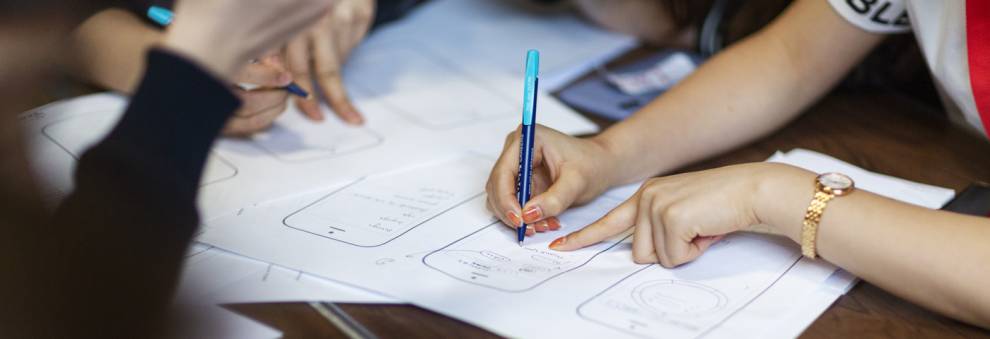JAKARTA, studyinca.ac.id – In today’s rapidly changing world, possessing strong problem-solving skills is essential for students. These skills not only facilitate academic success but also prepare students for real-world challenges they will face in their personal and professional lives. Problem-solving is more than just finding answers; it involves critical thinking, creativity, and the ability to analyze situations from multiple perspectives. This article explores the importance of problem-solving skills in school, effective strategies for developing these skills, and how they can be applied across various disciplines.
The Importance of Problem-Solving Skills in Education

1. Enhancing Academic Performance
Problem-solving skills are fundamental to academic success. Students encounter various challenges in their studies, from complex mathematical equations to intricate scientific experiments. By honing their problem-solving abilities, students can approach academic tasks with confidence and clarity.
Example: Math and Science Applications
In subjects like mathematics and science, students are often required to solve complex problems that require logical reasoning and analytical thinking. Mastering problem-solving skills enables them to break down these challenges into manageable parts, leading to more effective solutions.
2. Preparing for Future Challenges
The ability to solve problems is a critical skill that extends beyond the classroom. In an increasingly complex world, students must be equipped to tackle unforeseen challenges in their careers and personal lives. Strong problem-solving skills foster resilience and adaptability, enabling individuals to navigate obstacles with confidence.
Example: Real-World Scenarios
In the workplace, employees frequently encounter unexpected issues that require quick thinking and effective solutions. Employers value individuals who can analyze situations, identify potential solutions, and implement effective strategies. By developing problem-solving skills in school, students prepare themselves for future success in various fields.
3. Promoting Critical Thinking
Problem-solving is inherently linked to critical thinking. Students learn to assess situations, weigh alternatives, and make informed decisions. This process encourages a deeper understanding of the material and enhances their ability to think critically about various issues.
Example: Analyzing Case Studies
In subjects like social studies or business, students can engage in case studies that require them to analyze real-life scenarios, consider different perspectives, and propose viable solutions. This approach fosters critical thinking and encourages students to approach problems with an open mind.
Strategies for Developing Problem-Solving Skills
1. Encourage a Growth Mindset
Fostering a growth mindset is crucial for developing problem-solving skills. Students who believe they can improve their abilities through effort and perseverance are more likely to embrace challenges and seek out solutions.
Implementation
- Positive Reinforcement: Encourage students to view mistakes as learning opportunities rather than failures. Celebrate their efforts and progress, reinforcing the idea that persistence leads to success.
- Goal Setting: Help students set realistic goals for improving their problem-solving skills. Regularly review these goals to track progress and adjust strategies as needed.
2. Use Real-World Problems
Integrating real-world problems into the curriculum can enhance students’ engagement and motivation. When students see the relevance of problem-solving in their lives, they are more likely to invest effort into developing these skills.
Implementation
- Project-Based Learning: Design projects that require students to solve real-world problems, such as environmental issues, community challenges, or technological advancements. This hands-on approach encourages collaboration and critical thinking.
- Guest Speakers: Invite professionals from various fields to share their experiences with problem-solving in their careers. This exposure can inspire students and provide valuable insights into the application of their skills.
3. Promote Collaborative Learning
Collaboration is a powerful tool for enhancing problem-solving skills. Working in groups allows students to share diverse perspectives and approaches to challenges, leading to more comprehensive solutions.
Implementation
- Group Projects: Assign group projects that require students to work together to solve a problem. Encourage them to discuss their ideas, negotiate solutions, and divide responsibilities.
- Peer Teaching: Implement peer teaching sessions where students explain concepts or problem-solving strategies to one another. This reinforces their understanding and builds communication skills.
4. Teach Problem-Solving Frameworks
Providing students with structured frameworks for problem-solving can enhance their ability to approach challenges systematically. Familiarizing them with various models can give them the tools they need to tackle different types of problems.
Implementation
- The IDEAL Framework: Introduce the IDEAL model (Identify, Define, Explore, Act, Look back) to help students approach problems methodically. Encourage them to apply this framework to various scenarios, both academic and personal.
- Mind Mapping: Teach students to use mind maps to visually organize their thoughts and ideas when approaching a problem. This technique can help them identify connections and potential solutions.
5. Foster Creativity
Creativity plays a vital role in problem-solving. Encouraging students to think creatively can lead to innovative solutions and new ways of approaching challenges.
Implementation
- Brainstorming Sessions: Organize brainstorming sessions where students generate as many ideas as possible without judgment. This encourages free thinking and can lead to unexpected solutions.
- Artistic Expression: Incorporate artistic activities that allow students to express their ideas creatively. This can include drawing, writing, or performing, which can help them explore problems from different angles.
Applying Problem-Solving Skills Across Disciplines
1. Mathematics
In mathematics, problem-solving skills are essential for understanding concepts and applying them to real-world situations. Students must learn to analyze problems, identify relevant information, and develop strategies to arrive at solutions.
Example Activity: Math Challenges
Organize math challenges that require students to work collaboratively to solve complex problems. This encourages teamwork and fosters a deeper understanding of mathematical concepts.
2. Science
In science, problem-solving skills are crucial for conducting experiments and interpreting results. Students must formulate hypotheses, design experiments, and analyze data to draw conclusions.
Example Activity: Scientific Inquiry Projects
Engage students in scientific inquiry projects where they identify a problem, conduct research, and propose experiments to test their hypotheses. This hands-on approach enhances their problem-solving abilities and fosters a love for science.
3. Social Studies
In social studies, problem-solving skills are vital for understanding historical events, societal issues, and global challenges. Students must analyze different perspectives and propose solutions to complex problems.
Example Activity: Debates and Discussions
Facilitate debates and discussions on current events or historical dilemmas, encouraging students to explore various viewpoints and develop well-reasoned arguments. This promotes critical thinking and enhances their problem-solving skills.
4. Language Arts
In language arts, problem-solving skills are essential for interpreting literature and constructing coherent arguments. Students must analyze texts, identify themes, and develop persuasive writing skills.
Example Activity: Literary Analysis Projects
Assign literary analysis projects that require students to explore complex themes and character motivations. Encourage them to present their findings and propose solutions to the conflicts presented in the texts.
Conclusion
Problem-solving skills are crucial for students as they navigate their academic journeys and prepare for future challenges. By fostering these skills through various strategies—such as encouraging a growth mindset, using real-world problems, promoting collaboration, teaching structured frameworks, and fostering creativity—educators can empower students to become effective problem solvers.
As students develop their problem-solving skills across disciplines, they not only enhance their academic performance but also prepare themselves for success in an increasingly complex world. Ultimately, mastering the art of effective solutions equips students with the tools they need to tackle challenges, seize opportunities, and thrive in their personal and professional lives.
Improve Your Abilities: Explore Our content on Knowledge
Take a Look at Our Latest Article on Innovative Pathways!

